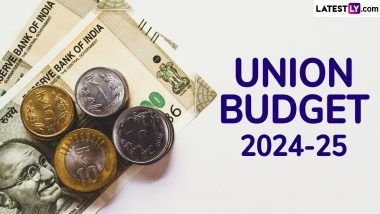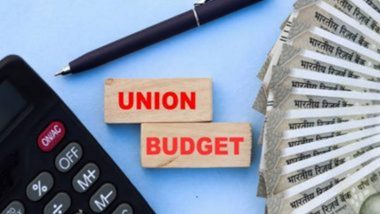New Delhi, July 18: The finance ministry in the forthcoming Union Budget needs to double the loan limit to Rs 20 lakh under the MUDRA Yojana, and expand the credit guarantee cover for unsecured loans for MSMEs from Rs 2 crore to Rs 5 crore. MSMEs also want incentives from the government to help them sell products globally. Finance Minister Nirmala Sitharaman will present the Union Budget for the current fiscal on July 23 in the Lok Sabha.
On expectations from the Budget, Navin Saini, chief business officer (Retail & MSME), Arka Fincap said the government will continue its agenda to provide a strong foundation for MSMEs, bolstering their growth. "To achieve this, they should consider increasing the loan limit of the Pradhan Mantri MUDRA Yojana (PMMY) scheme from Rs 10 lakh to Rs 20 lakh and expanding the credit guarantee cover for unsecured loans for MSMEs from Rs 2 crore to Rs 5 crore. Union Budget 2024: Higher GDP Allocation for Healthcare and Advances in Digital Health Infrastructure Is Imperative, Say Experts Ahead of July 23.
"These measures will provide MSMEs with greater access to necessary financial resources, enabling them to thrive and contribute significantly to the economy," Saini said. Mohit Jain, Managing director, Krisumi Corporation said the real estate sector has a lot of hope from the finance minister. "The upcoming budget should provide greater benefits to the salaried class as they have played a pivotal role in record-high direct tax collections. One such step would be to increase the tax exemption limit on both the principal amount and interest paid on home loans," he said.
Amid substantial rise in property value over the last couple of years, the current Rs 2 lakh tax rebate on housing loan interest should be enhanced to a minimum of Rs 5 lakh, Jain suggested. Amit Prasad, founder and CEO, SatNav Technologies said MSMEs which are focused on creating IPR have no formal funding process to grow internationally. The government, he said has a host of subsidies, incentives and foreign missions who are supposed to promote trade with multiple officers occupying plum posts in countries around the world.
"Giving them targets for growth of new business with a focus on IPR based entities can do wonders for our country and give us that next level boost, which can be 100x bigger than the IT Services boom of the past, as we embark on our journey to a Viksit Bharat 2047," Prasad added. On Tuesday, Sitharaman participated in a traditional 'halwa' ceremony, marking the final stage for preparation of the Union Budget 2024-25 to be unveiled on July 23 in the Lok Sabha. NAREDCO Proposes Key Tax Reforms in Union Budget to Boost Indian Real Estate Sector.
On expectations from Budget, Sunny Garg, co-founder, CRIB said there are various areas that need the finance minister's consideration, and the Budget presents an opportune moment to make these changes and improvements. "One critical area where startups expect relief is in simplifying the taxation framework for startups, as well as the tax treatment of ESOPs. Removing or rationalising the angel tax would also help significantly and enhance the availability of funds domestically, which is very crucial for early-stage funding," Garg said.
Vineet Narang, founder and managing director of HearClear India has urged the government to implement their proposal of expansion of Ayushman Bharat PM Jan Arogya Yojana to cover all senior citizens. "This should also cover in-home care needs of elderly patients. Today in-home care is the need of the hour and specifically with increasing age, healthcare at home will bring huge relief to our ageing elders," he said.
Deepak Pahwa, Director, Delair suggested the government should invest in R&D to support the local manufacturing of pharma products. "With the Indian pharma sector making significant strides globally, increased budget allocation can bolster our international standing. We anticipate initiatives incentivising R&D to support the local manufacturing of high-quality pharma products," he said. H S Bhatia, managing director, DAEWOO India said the consumer durables industry eagerly awaits the upcoming budget, hoping for measures to boost sales and growth.
Lowering import duties on crucial components could cut production costs, potentially increasing sales by 15-20 per cent, he said, and added prioritising research and development would boost domestic innovation and competitiveness. Chetan Vasudeva, senior vice president of business development at Elephant.in said the insurance sector has several key expectations from Budget 2024, including tax reforms to make annuity investments more tax-efficient, extend tax exemptions for retirement savings, and offer distinct tax benefits for term life plans to enhance coverage.
Other expectations include increased budgetary allocation, support for InsurTech startups, creation of a dedicated health regulator, and a boost in public healthcare expenditure to 2.5 per cent of GDP, Vasudeva said. Rajeev Kapur, MD, Steelbird Hi-Tech India and president Helmet Manufacturing Association India suggested that collaboration with the government to authorise institutions and NGOs, such as IITs and QCI, for helmet testing facilities would streamline the process and ensure stringent safety standards.
"Utilising corporate CSR funds effectively for road safety initiatives, with a proposed allocation of a specific percentage, could meaningfully contribute to enhancing road safety," Kapur said. Akash Agrawal, co-founder of Zoff Foods urged the government to address the current inverted tax structure within the Goods and Services Tax (GST) framework. "This structure impacts food manufacturers, hindering their ability to claim the full Input Tax Credit (ITC) due to higher tax rate paid for services and other items as compared to lower tax rate of raw materials," Agrawal said.
(This is an unedited and auto-generated story from Syndicated News feed, LatestLY Staff may not have modified or edited the content body)













 Quickly
Quickly





















